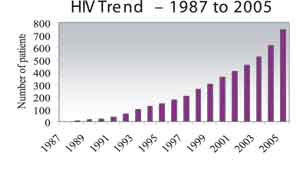|
|
||||||
|
Easy sex and rise in HIV
The couple quarrelled and the husband left home in anger. He did not return for a week. When he did, family life returned to normal. It was several months later that the husband and wife both found out that they were HIV Positive, pushing up Sri Lanka’s statistics. Just in that week away from home, the husband had indulged in intimate relations with a woman, picked up the Human Immunodeficiency Virus and later passed it on to his wife.
A worrying rise in the number of new HIV patients reporting to the National STD/AIDS Control Programme has been recorded since the third quarter of 2004, stresses Dr. Shantha Hettiarachchi adding that whereas earlier it was around 15 now it is between 25 and 30 each quarter.
“In the third quarter of 2004 the number of new patients rose to 39,” said Dr. Hettiarachchi who is the National HIV/AIDS Prevention Project Coordinator for Information, Education and Communication, however, explaining that Sri Lanka is a low-prevalence country. In the first quarter of this year the figure had been 28. Dealing with another aspect -- the transmission of HIV from mother to child -- that is sending out danger signals, a concerned Dr. Hettiarachchi says there were only 17 such instances reported since 1986 to the end of June 2005, but suddenly from July to December 2005 seven new cases were reported. “So at the end of March 2006, we have 24 cases of mother to child transmission.”
It is unfortunate that most of these women who have passed on HIV to their newborns have been infected by their husbands. They have had only one sexual partner and that is their husband, he explains. The reasons for the rising trend could be many pronged, The Sunday Times learns. The mobile phone is making sexual contact easily accessible, according to Dr. Hettiarachchi. In the past, sexual encounters usually took place in houses of ill-fame but that has changed completely. “Now you need only a mobile phone. The sex worker keeps a mobile and her clients contact her on that and then they meet in a designated place. Even if one person has the number of a sex worker, he passes it on to his friends and acquaintances,” says Dr. Hettiarachchi adding that casual sexual encounters are now taking place in some restaurants, karaoke bars and massage parlours. “There are mobile units in the form of vans that are being used in urban areas.” The modus operandi is for a client to call the driver or the broker, come see the sex workers in the van, pick out one and then take her somewhere else, it is understood. Another reason for the rising trend in HIV could be that most men and women marry in their thirties and till that time there could be influences that make them have several sexual encounters before settling down, he said while adding that awareness campaigns on HIV may also be encouraging more and more people to seek treatment if they suspect they are HIV Positive. Urging social and political changes, if Sri Lanka wishes to reverse the trend, he appealed to the media to be cautious about the reading material and programmes they were printing or sending over the air. This doctor who has worked with people who are HIV Positive for a long time says some men have described to him the profound influence the media has had on them, even to the extent of tempting them to seek casual sexual encounters. Citing an example, he said on Vesak day most TV channels devoted time to Vesak programmes but just the night before he himself saw one movie, the theme of which was the active sexual life of a very rich 15-year-old girl. Dr. Hettiarachchi also advised couples to settle their marital spats, which are normal and common in all marriages, as soon as possible. “Don’t let the anger spill over several days. Don’t let your partner leave the house without talking over the issue and settling what has been bothering both of you,” he added.
|
||||||
Copyright © 2006 Wijeya Newspapers
Ltd. All rights reserved. |

